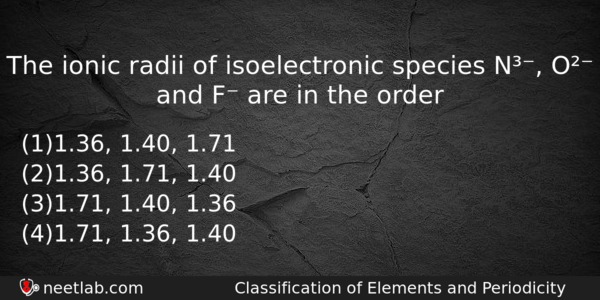| ⇦ | 
| ⇨ |
The ionic radii of isoelectronic species N³⁻, O²⁻ and F⁻ are in the order
Options
(a) 1.36, 1.40, 1.71
(b) 1.36, 1.71, 1.40
(c) 1.71, 1.40, 1.36
(d) 1.71, 1.36, 1.40
Correct Answer:
1.71, 1.40, 1.36
Explanation:
No explanation available. Be the first to write the explanation for this question by commenting below.
Related Questions: - Silver sulphide dissolves in a solution of sodium cyanide to form the complex
- Number of moles of MnO₄⁻ required to oxidize one mole of ferrous oxalate
- When river water meets sea water delta formation takes place. This is due to
- For spontaneous cooling of a hot metal rod (system) in air
- Antiseptic chloroxylenol is
Topics: Classification of Elements and Periodicity
(94)
Subject: Chemistry
(2512)
Important MCQs Based on Medical Entrance Examinations To Improve Your NEET Score
- Silver sulphide dissolves in a solution of sodium cyanide to form the complex
- Number of moles of MnO₄⁻ required to oxidize one mole of ferrous oxalate
- When river water meets sea water delta formation takes place. This is due to
- For spontaneous cooling of a hot metal rod (system) in air
- Antiseptic chloroxylenol is
Topics: Classification of Elements and Periodicity (94)
Subject: Chemistry (2512)
Important MCQs Based on Medical Entrance Examinations To Improve Your NEET Score
18000+ students are using NEETLab to improve their score. What about you?
Solve Previous Year MCQs, Mock Tests, Topicwise Practice Tests, Identify Weak Topics, Formula Flash cards and much more is available in NEETLab Android App to improve your NEET score.
Share this page with your friends

Leave a Reply